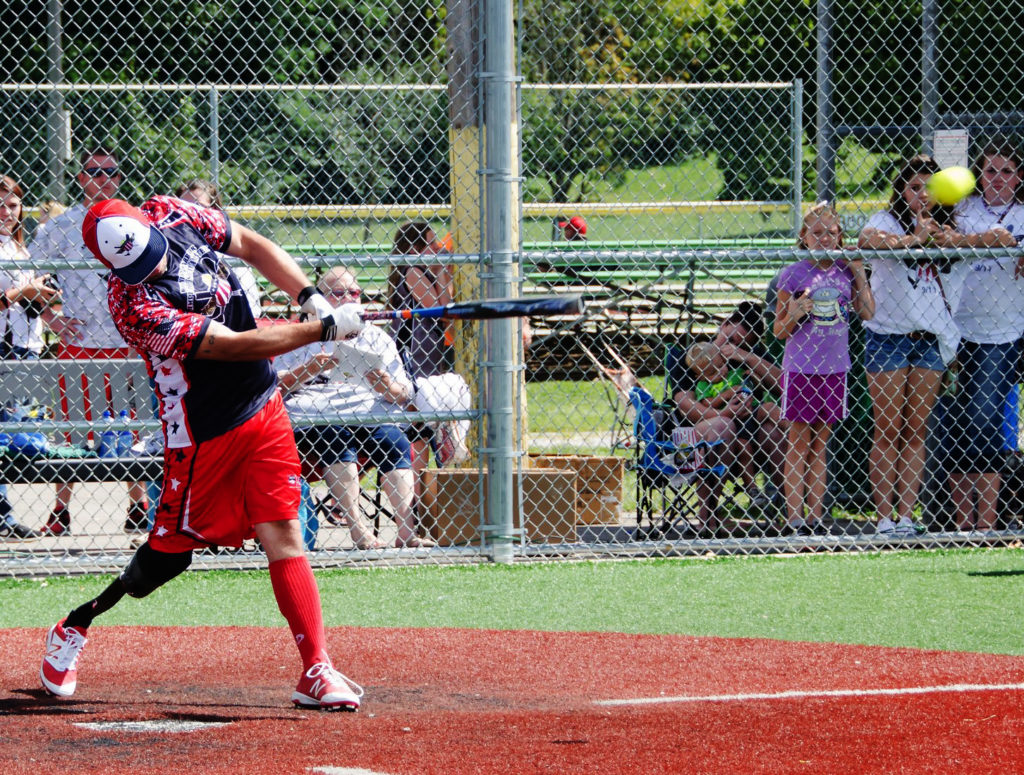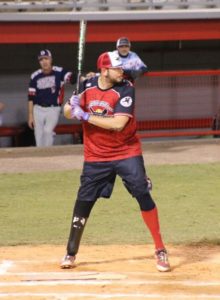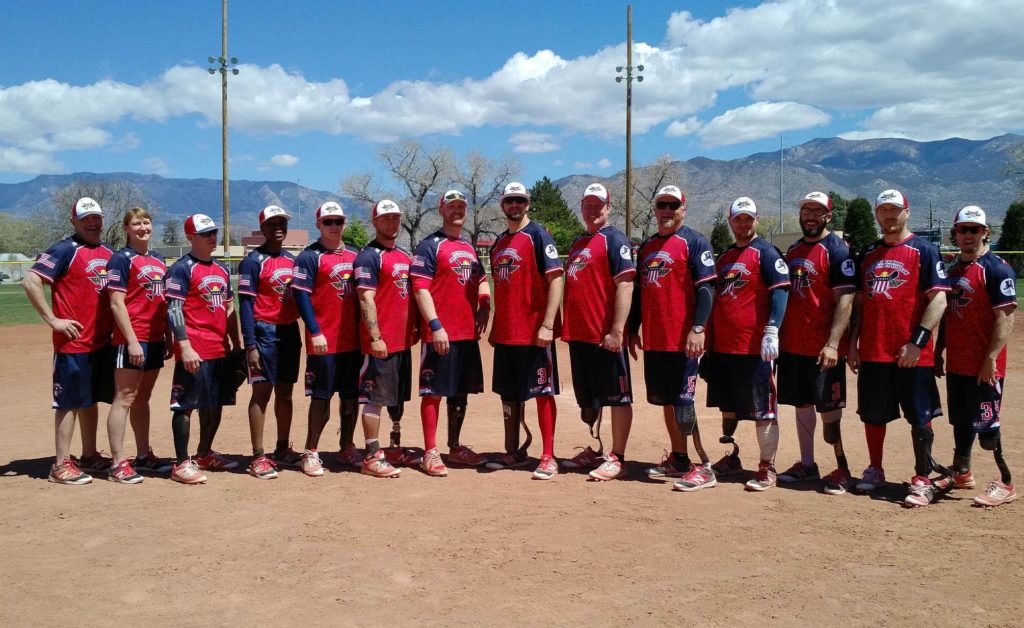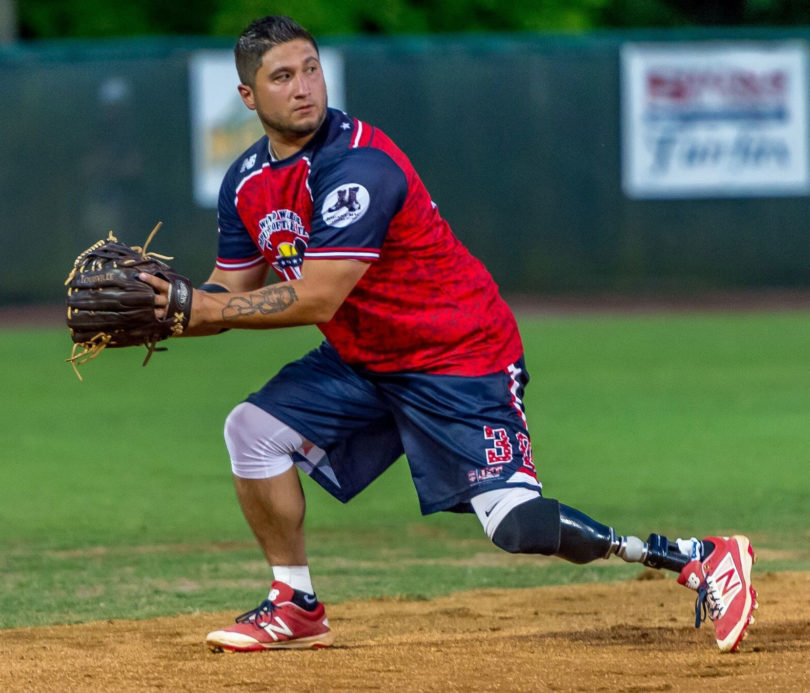After Dan Lopez lost his right leg above the knee, he tried sports that didn’t require him to run, including swimming, biking and seated volleyball. But softball was different. The Army veteran could hit the ball, but as he sprinted to first base on his new prosthetic leg, he would usually fall.
“Sniper!” his teammates yelled. And they would all laugh, together.
Wisecracks are always part of the game when the Wounded Warrior Amputee Softball Team, or WWAST, takes the field.
“The sense of brotherhood and support is phenomenal,” says Lopez, 37, a Williamsburg resident who joined the team a year ago. “I’ve learned that even if you get hurt, nothing is over. If you want to do something, there’s a way if you have the drive. You just have to adapt.”
These days, Lopez can run around the bases without falling, not to mention play catcher or any other position. He and his 30-some teammates compete despite missing one or more limbs, recovering from surgeries on salvaged limbs, carrying shrapnel inside their bodies or dealing with post-traumatic stress disorder.
WWAST, a nonprofit that recruits wounded veterans and active duty military around the country, will play a double header April 15 in Newport News against teams from the city’s police and fire departments. In addition to entering about 30 public events against able-bodied teams each year, the program organizes an annual summer camp for children who are amputees or who are missing limbs.
The WWAST aims to help veterans recover from their wounds — both visible and invisible — and inspire everyone, whether that person is a fellow military member, a cancer patient, a child or anyone struggling through hard times.
“This is not a pity party—we play 100 percent,” says Dennis Wince, WWAST’s executive director. “We fight and claw for every run, and we don’t want anyone taking it easy on us. We win more than we lose. After many games, people in the crowd are crying because our players have made such an impact.”
Corporal (Retired) Saul Bosquez was one of those sports-loving kids who played on two, or even three, baseball teams at a time. The former Wisconsin resident was on high school and college squads before he joined the Army in 2006.

Six months into his first deployment, on August 1, 2007, Bosquez was part of a four-vehicle convoy on morning patrol around downtown Baghdad, Iraq. He was in the second vehicle, riding in the right rear passenger seat, when a hidden roadside bomb exploded. Shrapnel from a battery box mushroomed around him and broke his left leg in 13 places. “Maybe more than 13,” he says. “I’ve seen the X-ray and my leg looked like puzzle pieces.”
While Bosquez never thought he would die, he remembers staring at the blood soaking his pants and wondering if he would ever walk or run again. He immediately lost part of his foot and, about two weeks later, decided to have his leg amputated six inches below the knee. “I wanted to get moving forward with life,” he recalls. He was inspired by fellow amputees at Walter Reed National Military Medical Center in Bethesda, Maryland. “As soon as I saw them walking and running, I knew I was gonna be just fine.”
In 2011, Bosquez became an original member of the newly-founded WWAST. There, he bonded with teammates who could understand everything he was feeling. On good days and bad, he could always be himself. He also met his future wife, Jessica, the team’s physical therapist and the sister of another player. At 32, Bosquez is a stay-at-home dad to their infant daughter.
Everything good I have in my life now,” he says, “is because of the team.”
Capt. Thomas Breitbeil also has played baseball his whole life. He is now the coordinator of the 18-member team from the Newport News Fire Department, which will take the field against the WWAST after its game against the Newport News Police Department.
The department was happy to join the event, especially since a number of first responders have served or are still serving in the military. “This is a way to do something small to pay back the veterans for what they have done for our country,” Breitbeil says. “They are heroes, and it should be a lot of fun.”
The WWAST often plays teams of first responders, Wince says. They also have taken on other military squads and celebrities, including Major and Minor League baseball players.
The lead sponsor of the Newport News event, Reach Orthotic & Prosthetic Services, works with many military patients. “We know firsthand the courage and determination amputee patients possess,” says Anne Sych, Marketing Coordinator for the practice. “This is a great way to show our community that there is life after amputation.”
Not that being an amputee athlete is easy. Bosquez says that when his leg is “cooperating” he doesn’t notice much difference from his younger baseball days, other than he can’t run quite as fast. But if he has one tiny problem, such as an ingrown hair near the line where his leg meets his prosthesis, the pain can be intense.
“Sometimes you can’t even put the prosthesis on,” he says. “It’s OK, though. It’s all part of the deal.” Athletes draw strength not only from each other but from the kids they work with at summer camp, he adds: “I had both my legs for 22 years. I’m lucky.”
Sergeant (Retired) Dan Lopez, who joined the Army in 1997, was lucky to escape physical injury during tours in Bosnia, Kosovo and Iraq. Nine days after returning from Iraq in 2006, he was driving on the New Jersey Turnpike, heading home to Virginia after visiting his wife’s family, when he had a flat tire. As he changed it on the side of the road, another driver lost control and sideswiped him. “It basically ripped off my leg,” he says. “It was held on by skin only.”
A friend traveling with Lopez, a fellow military man, pulled tools from a medic bag in the car and saved his life. Lopez remembers most of the scene, including asking his friend to find his cell phone and shoes ¾new Jordans that had been knocked off his feet by the impact. The car that hit him was totaled.
Doctors reattached Lopez’s leg and tried for 20 months to save it. More than 80 percent of the muscle healed, but the bone never did. “I was just ready,” he says of the decision to amputate. “It was like dragging around dead weight. It was hurting the rest of my body.”
Two weeks after the surgery, Lopez could walk without a cane. He got back into the gym and competed in seated sports in the 2010 Warrior Games. He tried out for the softball team in January 2016, played in six events last year and plans to double that number in 2017.
Now a father of four and working as a Red Cross instructor, Lopez is excited to introduce the WWAST to his home turf¾and vice versa. “Newport News police, I’ve had a couple tickets I’m still a little upset about,” he jokes. “We’re coming for you.”
And he won’t be falling down. Capt. Thomas Breitbeil also has played baseball his whole life. He is now the coordinator of the 18-member team from the Newport News Fire Department, which will take the field against the WWAST after its game against the Newport News Police Department.
The department was happy to join the event, especially since a number of first responders have served or are still serving in the military. “This is a way to do something small to pay back the veterans for what they have done for our country,” Breitbeil says. “They are heroes, and it should be a lot of fun.”
The WWAST often plays teams of first responders, Wince says. They also have taken on other military squads and celebrities, including Major and Minor League baseball players.
The lead sponsor of the Newport News event, Reach Orthotic & Prosthetic Services, works with many military patients. “We know firsthand the courage and determination amputee patients possess,” says Anne Sych, Marketing Coordinator for the practice. “This is a great way to show our community that there is life after amputation.”
Not that being an amputee athlete is easy. Bosquez says that when his leg is “cooperating” he doesn’t notice much difference from his younger baseball days, other than he can’t run quite as fast. But if he has one tiny problem, such as an ingrown hair near the line where his leg meets his prosthesis, the pain can be intense.
“Sometimes you can’t even put the prosthesis on,” he says. “It’s OK, though. It’s all part of the deal.” Athletes draw strength not only from each other but from the kids they work with at summer camp, he adds: “I had both my legs for 22 years. I’m lucky.”
Sergeant (Retired) Dan Lopez, who joined the Army in 1997, was lucky to escape physical injury during tours in Bosnia, Kosovo and Iraq. Nine days after returning from Iraq in 2006, he was driving on the New Jersey Turnpike, heading home to Virginia after visiting his wife’s family, when he had a flat tire. As he changed it on the side of the road, another driver lost control and sideswiped him. “It basically ripped off my leg,” he says. “It was held on by skin only.”
A friend traveling with Lopez, a fellow military man, pulled tools from a medic bag in the car and saved his life. Lopez remembers most of the scene, including asking his friend to find his cell phone and shoes ¾new Jordans that had been knocked off his feet by the impact. The car that hit him was totaled.
Doctors reattached Lopez’s leg and tried for 20 months to save it. More than 80 percent of the muscle healed, but the bone never did. “I was just ready,” he says of the decision to amputate. “It was like dragging around dead weight. It was hurting the rest of my body.”
Two weeks after the surgery, Lopez could walk without a cane. He got back into the gym and competed in seated sports in the 2010 Warrior Games. He tried out for the softball team in January 2016, played in six events last year and plans to double that number in 2017.
Now a father of four and working as a Red Cross instructor, Lopez is excited to introduce the WWAST to his home turf¾and vice versa. “Newport News police, I’ve had a couple tickets I’m still a little upset about,” he jokes. “We’re coming for you.”
And he won’t be falling down.

Capt. Thomas Breitbeil also has played baseball his whole life. He is now the coordinator of the 18-member team from the Newport News Fire Department, which will take the field against the WWAST after its game against the Newport News Police Department.
The department was happy to join the event, especially since a number of first responders have served or are still serving in the military. “This is a way to do something small to pay back the veterans for what they have done for our country,” Breitbeil says. “They are heroes, and it should be a lot of fun.”
The WWAST often plays teams of first responders, Wince says. They also have taken on other military squads and celebrities, including Major and Minor League baseball players.
The lead sponsor of the Newport News event, Reach Orthotic & Prosthetic Services, works with many military patients. “We know firsthand the courage and determination amputee patients possess,” says Anne Sych, Marketing Coordinator for the practice. “This is a great way to show our community that there is life after amputation.”
Not that being an amputee athlete is easy. Bosquez says that when his leg is “cooperating” he doesn’t notice much difference from his younger baseball days, except that he can’t run quite as fast. But if he has one tiny problem, such as an ingrown hair near the line where his leg meets his prosthesis, the pain can be intense.
“Sometimes you can’t even put the prosthesis on,” he says. “It’s OK, though. It’s all part of the deal.” Athletes draw strength not only from each other but from the kids they work with at summer camp he adds: “I had both my legs for 22 years. I’m lucky.”
Sergeant (Retired) Dan Lopez, who joined the Army in 1997, was lucky to escape physical injury during tours in Bosnia, Kosovo and Iraq. Nine days after returning from Iraq in 2006, he was driving on the New Jersey Turnpike, heading home to Virginia after visiting his wife’s family, when he had a flat tire. As he changed it on the side of the road, another driver lost control and sideswiped him. “It basically ripped off my leg,” he says. “It was held on by skin only.”
A friend traveling with Lopez, a fellow military man, pulled tools from a medic bag in the car and saved his life. Lopez remembers most of the scene, including asking his friend to find his cell phone and shoes new Jordans that had been knocked off his feet by the impact. The car that hit him was totaled.
Doctors reattached Lopez’s leg and tried for 20 months to save it. More than 80 percent of the muscle healed, but the bone never did. “I was just ready,” he says of the decision to amputate. “It was like dragging around dead weight. It was hurting the rest of my body.”
Two weeks after the surgery, Lopez could walk without a cane. He got back into the gym and competed in seated sports in the 2010 Warrior Games. He tried out for the softball team in January 2016, played in six events last year and plans to double that number in 2017.
Now a father of four and working as a Red Cross instructor, Lopez is excited to introduce the WWAST to his home turf and vice versa. “Newport News police, I’ve had a couple tickets I’m still a little upset about,” he jokes. “We’re coming for you.”
And he won’t be falling down.

Courage and Sacrifice
Since the attacks of September 11, 2001, hundreds of thousands of American service members have endured the visible and invisible wounds of war in Iraq, Afghanistan and other regions in support of the Global War on Terror. Many have survived severe injuries because of improvements in battlefield medicine and body armor. According to statistics from the Wounded Warrior Project, as of March 1, 2017, there have been:
- 6,892 deaths
- 52,448 injured
- 320,000 estimated traumatic brain injuries
- 400,000 estimated cases of Post-Traumatic Stress Disorder
For more information on support services for veterans and their families, as well as how to help the cause, go to:
www.woundedwarriorproject.org.


